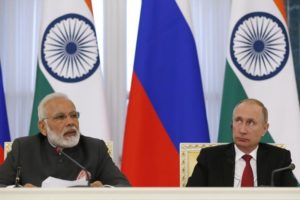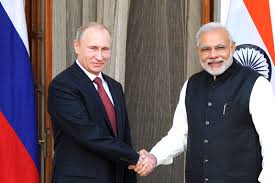
India and Russia on Thursday reaffirmed their “special and privileged strategic partnership” and signed five pacts, including a crucial agreement on setting up two more atomic power plants at Kudankulam in Tamil Nadu, as Prime Minister Narendra Modi and President Vladimir Putin discussed ways to smoothen bilateral relations.
The pacts were signed in St Petersburg on the third leg of Modi’s four-nation, six-day tour of Europe. Modi is in St Petersburg for the 18th India-Russia annual summit as well as the St Petersburg International Economic Forum.
The two countries are also marking 70 years of the establishment of diplomatic relations between them this year.
“Met President Putin. We had a wonderful meeting during which we discussed India-Russia relations,” Modi wrote in a Twitter post after a one-to-one meeting with the Russian leader.
The highlight of the day was India and Russia concluding a much-awaited pact for setting up the last two units of the Kundankulam nuclear power plant with Moscow’s help. The general framework agreement (GFA) and credit protocol for units 5 and 6 of the Kudankulam nuclear plant was among the five pacts signed on Thursday.
The reactors will be built by Nuclear Power Corporation of India Ltd (NPCIL) and Russia’s JSC Atomstroyexport, a subsidiary of Rosatom, the regulatory body of the Russian nuclear complex. Each of the two units will have a capacity to produce 1,000 megawatt (MW)of power. One 1,000MW nuclear power plant in Kudankulam is operational while another 1,000MW capacity plant is expected to go on stream later this year. Two others of equal capacity are under construction. India’s current nuclear power generation capacity is about 7,000MW.
A joint statement noted that the economies of India and Russia complemented each other in the energy sector and both countries will strive to build an “energy bridge”. It said the future of Indian-Russian cooperation holds great promise across a wide spectrum covering nuclear power, nuclear fuel cycle and nuclear science and technology.
Traditionally, India and Russia have shared a close relationship that dates back to the days of the Cold War, when the US tilted toward India’s neighbour and arch rival Pakistan. Much of India’s military hardware is still of Russian origin though India has diversified its defence procurement with major purchases of military hardware from the US, Israel and France.
On its part, Russia has been concerned at the rapidly warming ties between India and the US including the recent signing of a military logistics agreement.
India’s concerns vis-à-vis its once “trusted strategic partner” include its present tilt towards China with which India has a difficult relationship mainly due to an unsettled border dispute and Beijing’s close ties with Pakistan. Last year, Russia held its first ever military exercises with Pakistan, raising concerns in India.
Once seen as on the same page vis-à-vis concerns on terrorism emanating from Pakistan and Afghanistan, currently there are divergences between New Delhi and Moscow on that issue as well with Russia favouring a role for the rebel Taliban in a future Afghanistan against the rise of the Islamic State in the war-torn country. That Russia did not back India’s demand to name two Pakistan-based terror groups as perpetrators of terrorism against India last year at the Goa Brics (Brazil-Russia-India-China-South Africa) summit did not go down well with India.
In an interview to PTI on Thursday, Putin tried to assuage some of India’s concerns. “Russia is respectful toward all Indian interests,” Putin said. “Russia does not have any tight military relations with Pakistan.”
Putin added: “No matter where terror threat comes from, it is unacceptable and Russia will always support India in fight against terror.”
“There is no other country in the world that Russia has “deep cooperation” in delicate areas such as missiles,” Putin said adding Russia’s “trust-based” ties with India will not be diluted by Moscow’s growing ties with Pakistan and others.
The statement also said that India and Russia were looking to expand trade from the current $ 7.7 billion level to $ 30 billion by 2025.
